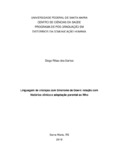| dc.creator | Santos, Diogo Ribas dos | |
| dc.date.accessioned | 2021-05-07T18:11:26Z | |
| dc.date.available | 2021-05-07T18:11:26Z | |
| dc.date.issued | 2019-08-20 | |
| dc.identifier.uri | http://repositorio.ufsm.br/handle/1/20817 | |
| dc.description.abstract | This dissertation aimed to analyze the development of language based on the speech and language evaluation of children with Down syndrome and its relationship with the type of therapeutic approach and the parental adaptation to the child's disability. It was a transversal research of the quantitative type, with descriptive and statistical analysis of the data. Twenty-nine children aged 3 to 6 years and their mothers participated in the study, evaluated in three clinical institutions that serve this population in Santa Maria and region. In the data collection, a language evaluation was performed through the Language Development Assessment (ADL) test with the children, through which the linguistic age of each child was identified. Parents responded to the Parental Scale for Adapting to the Child's Disability (PSACD). Socio-demographic data and the therapies performed by the children were also obtained from the parents and medical records of the institutions. Regarding the type of therapy, behavioral approaches with an exclusive focus in the grammatical field were classified as instrumental through strategies of stimulus-response-reinforcement type, and structural intervention, which approached the grammatical domain in enunciative scenes with valorization of the dialogue during the play. The results demonstrated that there was no statistical correlation between the type of therapy and the parental adaptation or even between the child's linguistic development and the parental adaptation. However, they showed a statistical correlation between speech therapy and language age. It was observed that there was no therapeutic work on the parental adaptation due to the absence of psychological support. The therapy that could impact on this process is centered on the family, but it wasn’t present in the investigated group. This fact evidenced that parents perform parental adaptation to the child's disability from their individual possibilities, without the proper support of the teams. The lack of difference between the two types of therapeutic approaches found, child-centered structural with family insertion in the session and child-centered instrumental without family participation, demonstrated that both types of approches are effective to promote grammatical domain in children language development. | eng |
| dc.language | por | por |
| dc.publisher | Universidade Federal de Santa Maria | por |
| dc.rights | Attribution-NonCommercial-NoDerivatives 4.0 International | * |
| dc.rights.uri | http://creativecommons.org/licenses/by-nc-nd/4.0/ | * |
| dc.subject | Síndrome de down | por |
| dc.subject | Linguagem | por |
| dc.subject | Terapia de linguagem | por |
| dc.subject | Adaptação parental | por |
| dc.subject | Down syndrome | eng |
| dc.subject | Language | eng |
| dc.subject | Parental adaptation | eng |
| dc.title | Linguagem de crianças com Síndrome de Down: relação com histórico clínico e adaptação parental ao filho | por |
| dc.title.alternative | Language of Down Syndrome Children: relationship with clinical history and parental adaptation to the child | eng |
| dc.type | Dissertação | por |
| dc.description.resumo | Esta dissertação teve como objetivo analisar o desenvolvimento da linguagem a partir da avaliação fonoaudiológica de crianças com síndrome de Down e sua relação com o tipo de abordagem terapêutica e com a adaptação parental à deficiência do filho. Tratou-se de uma pesquisa transversal do tipo quantitativa, com análise descritiva e estatística dos dados. Participaram da pesquisa 29 crianças na faixa etária de 3 a 6 anos e suas mães, avaliados em três instituições clínicas que atendem essa população em Santa Maria e região. Na coleta de dados foi realizada avaliação de linguagem por meio do teste Avaliação do Desenvolvimento de Linguagem (ADL) com as crianças, por meio do qual identificou-se a idade linguística de cada criança. Os pais responderam à Escala Parental de Adaptação à Deficiência do Filho (EPAD). Dados sóciodemográficos e das terapias realizadas pelas crianças também foram obtidos junto aos pais e prontuários das instituições. Quanto ao tipo de terapia, classificou-se como instrumental as abordagens comportamentais com foco exclusivo no domínio gramatical por meio de estratégias de tipo estímulo-resposta-reforço, e intervenção estrutural as que abordavam o domínio gramatical em cenas enunciativas com valorização do diálogo durante o brincar. Os resultados demonstraram não haver uma correlação estatística entre o tipo de terapia e a adaptação parental ou mesmo entre o desenvolvimento linguístico infantil e a adaptação parental. Evidenciaram, no entanto, correlação estatística entre o tempo de terapia fonoaudiológica e a idade linguística. Observou-se que não havia trabalho terapêutico sobre a adaptação parental em função da ausência de suporte psicológico. A terapia que poderia impactar sobre esse processo se centrada na família, também não esteve presente no grupo investigado. Esse fato evidenciou que os pais realizam adaptação parental à deficiência do filho a partir de suas possibilidades individuais, sem o devido suporte das equipes. A ausência de diferença entre os dois tipos de abordagens terapêuticas encontradas, estrutural centrada na criança com inserção da família na sessão e instrumental centrada na criança sem participação da família, demonstrou que os dois tipos de abordagem são efetivos do ponto de vista gramatical no desenvolvimento linguístico das crianças. | por |
| dc.contributor.advisor1 | Souza, Ana Paula Ramos de | |
| dc.contributor.advisor1Lattes | http://lattes.cnpq.br/7859963389320763 | por |
| dc.contributor.referee1 | Mezzomo, Carolina Lisbôa | |
| dc.contributor.referee1Lattes | XXXXXXXXXXXXXXX | por |
| dc.contributor.referee2 | Vidor, Deisi Cristina Gollo Marques | |
| dc.contributor.referee2Lattes | XXXXXXXXXXXXXX | por |
| dc.creator.Lattes | XXXXXXXXXXXXXXXXXXXXXX | por |
| dc.publisher.country | Brasil | por |
| dc.publisher.department | Fonoaudiologia | por |
| dc.publisher.initials | UFSM | por |
| dc.publisher.program | Programa de Pós-Graduação em Distúrbios da Comunicação Humana | por |
| dc.subject.cnpq | CNPQ::CIENCIAS DA SAUDE::FONOAUDIOLOGIA | por |
| dc.publisher.unidade | Centro de Ciências da Saúde | por |



